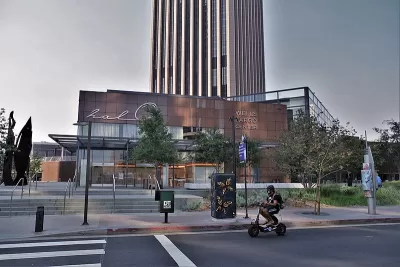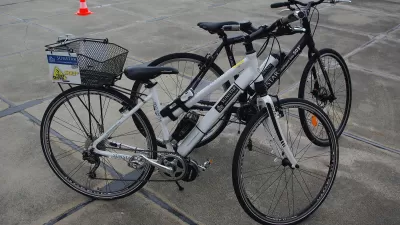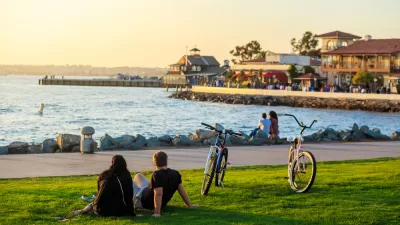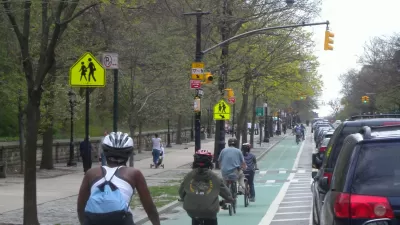A new e-bike credit, if coupled with improved bike safety infrastructure, could encourage many Americans to replace short car trips with e-bike rides, reducing emissions and congestion.

In an article for Streetsblog, John Stout writes that "it’s clearer than ever that we need to do everything in our power to mitigate our country’s impact on the climate crisis," and e-bikes may be one powerful tool for doing so. And, as it turns out, they're getting some support in the bipartisan infrastructure package and budget reconciliation.
"In a nod to the nascent American 'bike boom,' which saw e-bike sales triple in 2020, as COVID-19 lockdowns forced many to stay home and those still commuting to grow weary of using public transit, the multi-trillion dollar Build Back Better legislation includes a whopping $7.4 billion measure for e-bikes," translating into as much as $750 in credits for e-bike purchases.
But while "making e-bikes more affordable is key to increasing adoption, many would-be riders are still too fearful to take to the streets on two wheels because of safety concerns on our country’s car-centered roadways." The infrastructure legislation takes this into account and "would push federal regulators to better account for the safety of not only drivers, but also cyclists and pedestrians."
Stout argues that "if we provide Americans with the right tools, we can make biking a viable option by making it easier for people to replace shorter car trips with bike trips." But Congress must take action to "rally behind the bipartisan infrastructure and reconciliation legislation. By passing these two historic climate bills, the federal government can ensure that cyclists can ride safely on our roadways and ensure that all Americans can afford new road-ready e-bikes."
FULL STORY: OPINION: E-bikes Could Become a Weapon Against Climate Change

Alabama: Trump Terminates Settlements for Black Communities Harmed By Raw Sewage
Trump deemed the landmark civil rights agreement “illegal DEI and environmental justice policy.”

Planetizen Federal Action Tracker
A weekly monitor of how Trump’s orders and actions are impacting planners and planning in America.

The 120 Year Old Tiny Home Villages That Sheltered San Francisco’s Earthquake Refugees
More than a century ago, San Francisco mobilized to house thousands of residents displaced by the 1906 earthquake. Could their strategy offer a model for the present?

In Both Crashes and Crime, Public Transportation is Far Safer than Driving
Contrary to popular assumptions, public transportation has far lower crash and crime rates than automobile travel. For safer communities, improve and encourage transit travel.

Report: Zoning Reforms Should Complement Nashville’s Ambitious Transit Plan
Without reform, restrictive zoning codes will limit the impact of the city’s planned transit expansion and could exclude some of the residents who depend on transit the most.

Judge Orders Release of Frozen IRA, IIJA Funding
The decision is a victory for environmental groups who charged that freezing funds for critical infrastructure and disaster response programs caused “real and irreparable harm” to communities.
Urban Design for Planners 1: Software Tools
This six-course series explores essential urban design concepts using open source software and equips planners with the tools they need to participate fully in the urban design process.
Planning for Universal Design
Learn the tools for implementing Universal Design in planning regulations.
Clanton & Associates, Inc.
Jessamine County Fiscal Court
Institute for Housing and Urban Development Studies (IHS)
City of Grandview
Harvard GSD Executive Education
Toledo-Lucas County Plan Commissions
Salt Lake City
NYU Wagner Graduate School of Public Service





























